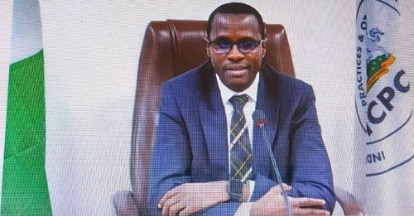ICPC Reaffirms Commitment to Tackling Corruption in Transport Sector, Seeks Stronger Collaboration With FRSC

The Chairman of the Independent Corrupt Practices and Other Related Offences Commission (ICPC), Dr. Musa Aliyu (SAN), has restated the commission’s determination to intensify corruption-prevention efforts within Nigeria’s transport system.
ICPC spokesperson, Okor Odey, disclosed this in a statement issued on Tuesday in Abuja.
According to the statement, Aliyu made the remarks while receiving the Corps Marshal of the Federal Road Safety Corps (FRSC), Shehu Mohammed, who paid a courtesy visit to the commission’s headquarters.
Aliyu noted that the transport sector remains central to national development and public safety, warning that vehicles are often used to facilitate criminal activities.
He stressed the need for deeper cooperation between the ICPC, FRSC, and other security agencies to boost road safety, reinforce accountability, and promote economic efficiency.
The ICPC chairman praised the FRSC for its recent technological advancements, particularly the Contactless Driver’s Licence Processing System, which he said has significantly reduced opportunities for corruption by limiting human contact.
He also commended the Premium Driver’s Licence Service, stating that the improved processing timelines have strengthened confidence among road users.
Aliyu reiterated ICPC’s readiness to enhance the capacity of the FRSC’s Anti-Corruption and Transparency Unit, noting that strong internal controls and early detection mechanisms are crucial in fighting unethical conduct within public institutions. He added that ICPC staff, including official drivers, would undergo FRSC-led training programmes on safe driving and responsible road usage.
He further directed relevant ICPC departments to work with the FRSC on joint awareness campaigns aimed at promoting both safety and integrity across the country.
In his remarks, Corps Marshal Mohammed described the FRSC as the nation’s leading authority on road management and safety.
He highlighted ongoing reforms aimed at boosting service delivery, including the agency’s current capacity to produce as many as 25,000 driver’s licences daily, backed by enhanced data-protection systems to combat identity fraud.
Mohammed also pointed to the new Contactless Licence Renewal Platform as a major step forward, as it accelerates processing times and reduces physical contact that could enable corrupt practices. Other innovations, he said, include the Standard and Premium Licence categories, an upgraded National Vehicle Identification System for quicker verification, and an improved Passenger Manifest System designed to enhance passenger safety and emergency response.
Closing the meeting, ICPC Secretary, Clifford Oparaodu, commended the FRSC for its progressive reforms and expressed confidence that the growing partnership between the two agencies would continue to strengthen transparency, accountability, and integrity across Nigeria’s transportation and public-service sectors.









